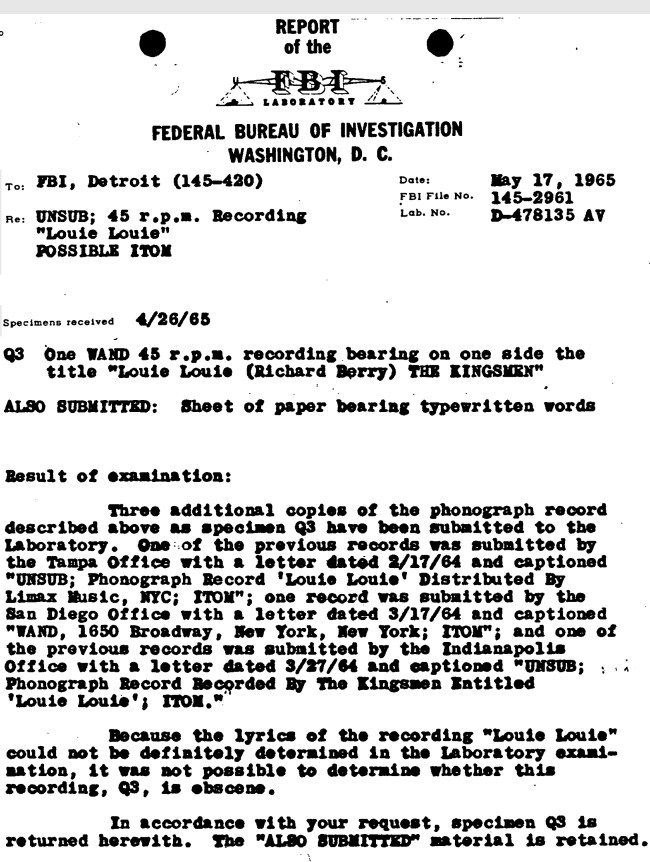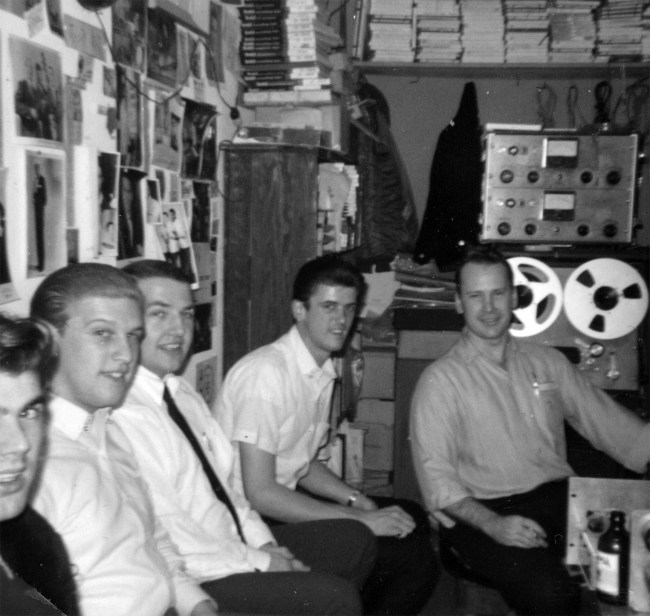At the time, they didn’t know it would change the music world, and their lives, forever.
Interviewing current and former Kingsmen members Dick Peterson, Steve Peterson and Barry Curtis, as well as Hollywood Walk of Fame DJ, Brien Bierne, wasn’t just fascinating—it was fun. They talked to me about The Kingsmen, “Louie Louie,” and how it all began more than 50 years ago.
Francis Ford Coppola once said art depends on luck and talent. For the legendary Kingsmen, it involved luck and talent, but timing as well. Dick Peterson, one of the band’s early drummers, is quick to admit The Kingsmen’s rocket to fame was the result of the perfect musical storm.
In the early 1960s, rockabilly stars from the 1950s were still churning out hits. But the early 1960s also ushered in new and eclectic sounds ranging from novelty songs to musical styles including folk, doo wop, rhythm and blues, surf and Motown. Of that time, Peterson, “The fan focus was shifting from individuals like Elvis, Fabian and Frankie Avalon to an era of bands.’”
As the musical scene was evolving, former disc jockey Brien Beirne, sees one event as a major catalyst. “In fall of ’63 when The Kingsmen came out with ‘Louie Louie,’ a very interesting thing happened that I think changed everything musically,” he reflects. “It was the death of President John F. Kennedy. Everybody was looking for an escape. It was such a horrific, devastating moment, and I believe it opened the door to lots of new sounds. The Kingsmen were part of the wave that represented escapism for the youth of the day.”
Louie Louie 45 RPM © 2006 Richard Peterson
So, in April 1963, when five young guys in Portland, Oregon, recorded an audition tape to land a gig on a cruise ship, they were unprepared for what was about to come.
The Kingsmen’s version of “Louie Louie” was popular in the Portland area, where it enjoyed cross-pollination by local KISN AM rock DJ, Ken Chase. Chase also financed the $36 needed to produce the demo destined to become the iconic hit single, and hosted The Kingsmen as the house band in his teen nightclub, The Chase. Beirne, who was a teenager in the Portland area at the time, remembers it being such a hot ticket “that it didn’t matter how many pimples you had—if you could get a table for you and your date at The Chase, you were ‘golden’ for the evening.”
The band enjoyed success and played packed houses, but it wasn’t until Boston’s most popular DJ, Arnie Ginsburg, aired the song as “The Worst Record of the Week,” that “Louie Louie” experienced a meteoric surge in popularity. The reason? Unintelligible lyrics had teenagers imagining the words were laced with profanities and descriptions of sexual acts!
They didn’t realize the poor sound recording would be a critical factor in the song’s appeal, but several things came into play:
- Jack Ely, the lead singer on the recording, had just had his braces adjusted and his mouth was in pain;
- The sound engineer refused to move any of the microphones nearer to Ely, impacting the clarity of the lyrics; and
- The band had not tightly rehearsed, which opened the door to spontaneity.
The ambiguous lyrics, the rough sound and energy, and the luck of having Ginsburg spin the song when he did was pure genius, but unplanned. Peterson laughs, “It was very fortunate. Without the controversy, I think The Kingsmen’s version of ‘Louie Louie’ would’ve died.”
To be continued…
###
_________________________________________________________
Terri Nakamura is a professional graphic designer who loves social media, music and writing. Follow her on Twitter: @terrinakamura; Read her blog, Confessions of a Graphic Designer: http://seattledesigner.blogspot.com/ or find her connections: http://about.me/terrinakamura
© 2010-13 Terri Nakamura
________________________________________________________






